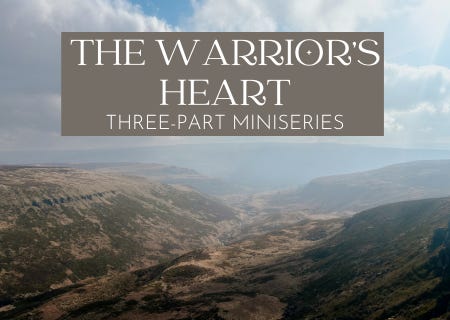My fiction writing is for my members only (although you can read the first 25% free as a taster). The beauty of this period, for fiction writers, is that the surviving written record is so tiny that we can create these stories suggesting what their lives might have been like. To access this content (and unlock all my fiction writing), you can subscribe below.
This episode is part one in a new miniseries intended to depict the humanity of the individuals more often portrayed as fearless warriors. Some may truly have been fearless, but I find it more likely that most were wracked with terror as they approached the battlefield. It is this part of their lives that I am seeking to portray in this miniseries, the part that is, perhaps, most relatable to us today, as well the one rarely shared in the history books.
I guess this is the fate that befalls all men like me. Sooner or later.
Escaping it is not really an option.
Or is it?
I feel like a man when I stand in for my father. Though I’m barely old enough to grow a beard, I like that he trusts me to tour through the village settlements that make up our hard-won kingdom. The people see me sitting in his place, and to them I’m not some squeaky eighteen-year-old: I’m representing the king. I’m an authority figure. I mean something. It’s like I can pretend to be someone I’m not: someone strong, a fearsome warrior who has earned the trust of his people through decades of faithful protection.
That warrior is, of course, actually my father, not me.
But I can pretend, can’t I? I can embody that same spirit while I sit here in authority over these people, can’t I?
I know it’s all just pretend., but it feels pretty special, this preview of the life that lies before me.
We visit each village once per season. It is hard, grinding work: setting off at dawn even in the summer months, we often return close to nightfall, and occasionally have had to depend on the good grace of minor lords to extend overnight hospitality. Today it is hot, the sun beating down as we sit receiving payments due. Some are presented to us in kind: animals, produce, grain. Others are in the form of metals, carefully weighed to check their value. All are given as products of their industry, contributing to the running of the king’s hall and enabling him to build the kingdom’s wealth through trade.
As another weary-looking villager approaches, however, I hear the words that have rung in my ears this season.
“I’m sorry, my lord. We just couldn’t get it together. We’ll add it to the autumn harvest render.”
I press my hand to my forehead. The sheep and cows thus far collected have already begun their trudge back to the hall, but though the cart should be almost overflowing, the other renders collected already are barely visible over the sideboards. This has been the story in village after village.
“The harvest, my lord. It’s just not what it used to be.”
“I’m sorry, my lord. We just haven’t been able to weave as much as we needed to with the men away.”
“I’m sure that the cows will yield more milk once the weather has cooled.”
It’s draining. One or two families failing to meet their quota can be overlooked. Compassion prevails and it presents an opportunity to appear benevolent. Benevolence is important, in our culture built on connection: my father has spent decades building ties between himself, his top fighting men, and his peasants, knowing that they will all come when he calls.
But we must be missing a third of what is due. The graciousness that marked our first few days, when we were naïve to the situation that lay before us, has vanished, and we are tempted to be angry with these villagers who have no recourse to fulfil their quota.





